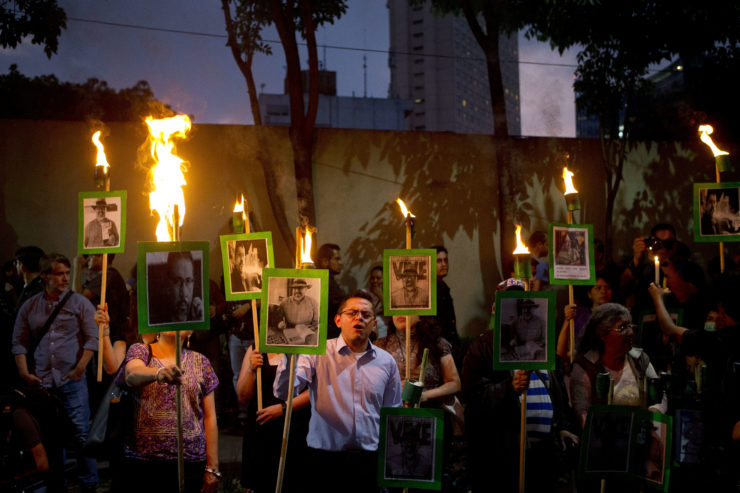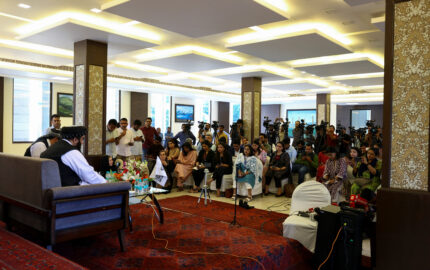Today [June 8] marks one week since I returned to Mexico after 10 months in the United States on a Nieman Fellowship.
On my first day back, I talked to 15 Michoacán colleagues who had taken a personal day or asked for unpaid leave in order to attend a protest outside the PGR [Attorney General’s Office] to call attention to the silence around the disappearance of Salvador Adame, their colleague from the newspaper La Voz de Tierra Caliente. At the protest I ran into two Mexico City colleagues who, when they saw me, began talking about how overwhelmed they felt by the impact of so many deaths, about the need for psychological support, about feeling they could be the next to die. Their question: what do we do?
That night I saw a dear friend trapped in the infinite web of trying to make sense of the senseless murder of Javier Valdez Cárdenas, the tangle ensnaring us all. The chat groups churn with messages proposing new initiatives, new information, posting new emergencies, one day alerting us of a reporter in Quintana Roo whose ear was cut off as a warning to the owner of his newspaper and another of an indigenous radio announcer who was attacked or of a photographer’s teenage daughter who was disappeared (and, thankfully, later found). When we message each other, we ask if help arrived for the 7 reporters and photographers ambushed by 100 armed men in Guerrero and stripped of their equipment; if there were funds to pay for Javier’s wake and to compensate his family; if anyone knows how the guys from RíoDoce newspaper are dealing with their pain of losing Javier; if anyone knows of therapists who could travel to Sinaloa or Guerrero to attend to colleagues there.
Every day I get messages from colleagues asking for help in stopping the new state laws being passed by legislators supposedly to “protect journalists” but that are loaded with poison, others who need advice about putting together their own self-defense journalist collectives, others asking that we run their inserts addressed to the authorities or photos of their demonstrations, others that we share the articles they are publishing every day so that the issue doesn’t fade.
There have been days full of meetings over coffee to listen to friends who don’t know what to do with the anxiety eating at them or who haven’t been able to cry over the loss of the friend-colleague-big brother that Javier was, or, who with Javier’s murder have to relive the killings that once forced them to flee their homes for the DF [Mexico City]. Of the Twitter campaign defending a Sonoran colleague kicked off his radio program for not toeing the official line. Of calls from frustrated local media directors after leaving the Interior Ministry, having listened to officials say that they are overwhelmed and can’t figure out what to do. Of evening gatherings to brainstorm about what we can do to put an end to the State’s policy of impunity; asking each other for details about the most recent crimes to try and understand their hidden messages; considering where we can and can’t practice journalism; sharing anecdotes of nocturnal paranoias; talking to human rights defenders and sharing our assessments, our uneasiness, our ideas for action.
The struggle against silence in Mexico is a relay race, that one day some are tagged to stop and catch their breath (or save their lives) and others to return rested with a fresh perspective in order to begin again
I, like many of us, have been converted into a kind of air traffic controller, trying to manage initiatives that our more clearheaded colleagues are launching—to publish something on the anniversary of Javier’s death, to read Javier’s work, to blanket the city with posters, to make a collection for media in crisis. Yesterday at the end of the press conference in which we invited our profession to next week’s encounter between journalists to discuss our problems and design solutions, one of the reporters interviewing me began to cry when we were talking about Miroslava Breach’s assassination because she’s a mother too.
Days full of plans, many, and attempts at trying to shape a future where there is a place for journalists, in which information doesn’t become dangerous, in which we learn to respect each other. Days filled with explaining that if a journalist is killed, what he or she was reporting is also silenced. Days of mescal and of plans to meet, of advising colleagues that maybe they should prepare to leave the country because they could be next, of sending messages of support to those who have already gone, of reviewing our own practices and our own work inspired by the example of Javier, of swallowing our rage and grief because for lack of funds they didn’t get him out when he asked for help, of feeling that in 10 years of living in this emergency we haven’t learned much as a profession to make it a little harder for the killers, of thinking that maybe Javier, Miroslava, Choco, Regina, and Rubén weren’t murdered so much for what they published as to terrorize the rest of us. Telling ourselves that it’s going to get worse and that we have to steel ourselves in preparation.
Despite the sorrow and the fear that I now have to live with, I feel clear and serene, a little wiser after my experience, knowing that the struggle against silence in Mexico is a relay race, that one day some are tagged to stop and catch their breath (or save their lives) and others to return rested with a fresh perspective in order to begin again. Days of shared embraces, of solidarity, of silence, of encouragement, of being orphaned, of love, of welcome, of loss. But also of looking to the future. A future where we have each other because we are alive and because we have everything left still to build.



